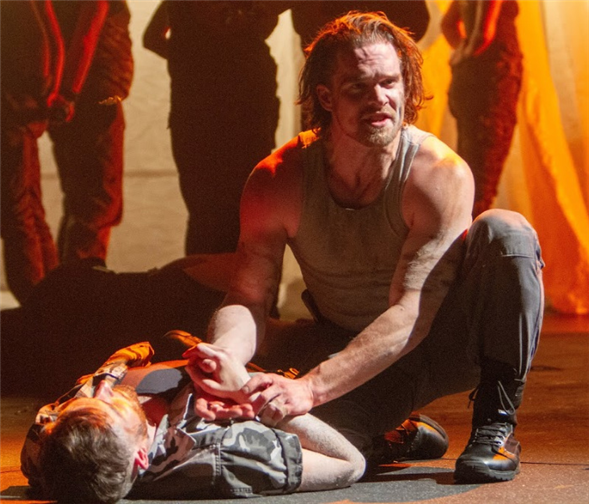Translate Page

Director Shana Cooper reimagines Shakespeare's tragedy for our polarized political age
Pieces of the set literally fall apart during Theatre for a New Audience's kinetic production of Shakespeare's The Tragedy of Julius Caesar. The startling destruction happens during the storm that precedes the assassination of the titular general by his frenemies in the Roman senate. "The supernatural aspects of this play -- the way in which nature is unhinged and is reflecting the diseased psyche of the nation -- really appealed to me," says director Shana Cooper, who makes her Off-Broadway debut with the show. "I think there is something very purposeful in terms of the meaning of that storm that begins in the scene where Brutus and Cassius first conspire. I was excited to explore just how that manifests on stage."
Scenic designer Sibyl Wickersheimer created a construction zone that underscores the tenuous state of the republic at that time. "This was a Rome coming out of a civil war," Cooper says. "The walls of the senate are part tarp because an attempt at rebuilding civilization is in progress. The thing that really grabbed hold of my heart, and has just not let go, is how much the play is really a meditation on this relentless cycle of violence that we are caught in, and the consequences of using violence as a tool for governance."
A graduate of the Yale School of Drama, Cooper first directed Julius Caesar at the Oregon Shakespeare Festival in 2017, the same year Oskar Eustis staged his controversial Trumpian take on the tragedy at the Public's Shakespeare in the Park. But Cooper insists the play feels even more vital today. "I think the stakes are more critical in the year leading up to the 2020 election," she says. "We are on the precipice of making these fundamental choices about who will run our country and how we will govern. I think we are at a moment where we really need to be in conversation with this play."
{Image1}
In order to drive home the human toll of this brutal tale, Cooper took some liberties with the often-confusing battle scenes in the last third of the play. "In some productions I've seen, once they launched into the war, the show would just kind of unravel," she says. "Suddenly you have a million characters you have never met before, dying left and right." Instead of getting lost in the "sprawl and mess," Cooper opted to focus on personal conversations between the key players in the midst of battle, and she transformed the remaining combat sequences into highly stylized physical storytelling that is "part combat, part martial arts and part dance."
Cooper also makes a striking statement about men's penchant for violence by casting women in two traditionally male roles: the Soothsayer and Cicero. "There aren't a lot of roles for women in this play, and it feels quite true to me that these are the people in this society warning of the danger to come and nobody listens," she says. "Cicero is the one senator who doesn't openly choose a side, which is interesting since a lot of the conflict and violence happens because of how divided the senate is. To have that person be female felt like a powerful story to tell."
While it's usually billed simply as Julius Caesar, restoring Shakespeare's full title reminds audiences that, ultimately, this story is a tragedy for all involved and that everyone has blood on their hands. "Shakespeare doesn't let any of us off the hook in terms of recognizing our own culpability and our own responses to this cycle of violence," Cooper says. "I have a son who is four, and I think a lot about the stories that our children inherit and the way in which those myths live on through their actions. How do you start to offer them a new story?"
---
TDF MEMBERS: At press time, discount tickets were available for The Tragedy of Julius Caesar. Go here to browse our current offers.
Gerard Raymond is an arts journalist based in New York City.
Stephen Michael Spencer and Matthew Amendt in The Tragedy of Julius Caesar. Photos by Henry Grossman.